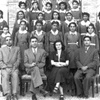Disclaimer
This entry contains information known to us from a variety of sources but may not include all the information currently available. Please be in touch if you notice any inadvertent mistakes in our presentation or have additional knowledge or sources to share. Thank you.
Archive
AIU School at Esfahan, Iran
AIU school at Esfahan, Iran. The school transformed the Jewish culture of Esfahan from traditional to modern, from religious to secular, and from financially poor to wealthy.
Description
The AIU was a French Jewish non-profit established by wealthy French Jews to help poor Jews in Islamic nations of North Africa and the Middle East. Prior to the AIU schools in Iran, many Jews were harassed and despised by the Muslim majority. The shah eventually permitted the first AIU school in Iran in 1898, and this was quickly followed by other AIU schools in Iran, including the one in Esfahan. It transformed the culture. Until World War 2, virtually all Iranian Jews were devout, observing religious rituals, and cherishing age-old values. They celebrated all their traditional Jewish holidays, festivals, and Sabbaths. They educated their children in Jewish educational institutions, to raise their children to cherish Judaism and their religion. Most Jewish people in Esfahan knew the Hebrew language The Persian Jewry were very devout, and, while united economically to their neighbors, they were separated culturally and socially.
After World War Two, the disintegration of Jewish faith occurred during French-western culture's humanistic impact. The AIU schools, with curriculum borrowed form French schools, emphasized secular studies over religious studies. The AIU leaders had confidence in the significance of French culture and western Haskalah. Iranian Jewish AIU students in Esfahan studied French literature, and studied the history of their own people in history textbooks written in the French language by Frenchman who had never met Persian Jews. AIU schools had students devote less time to biblical and liturgical studies, though these were the prime area of study in the traditional schools. There were even some AIU schools that did not have students study Judaism at all. Generally, Hebrew was not studied at these schools. This led to some anguish among Persian Jews, as they observed many children becoming disconnected from their heritage. In response, some AIU administrators began to add some curriculum that had previously been omitted: Jewish history and Hebrew.
Thus, the AIU school in Esfahan helped transform the culture. The AIU schools also helped the Jewish people to become financially successful—they became financially wealthy and respected internationally. With their education, they became involved with universities and international commerce. Today, especially in America, many Jewish immigrants from Esfahan owe their financial success and respect in part to the AIU schools.
Sources
Cohen, Avraham. "Iranian Jewry and the Educational Endeavors of the Alliance Israélite Universelle." Jewish Social Studies 48.1 (1986): 15-22. JSTOR. Web. 8 July 2014.
Melamed, Karmel. "Former Iranian Jewish Journalist Shares His Story." Iranian American Jews. Jewish Journal, 18 Nov. 2007. Web. 8 July 2014. <http%3A%2F%2Fwww.jewishjournal.com%2Firanianamericanjews%2Fitem%2Fformer_iranian_jewish_journalist_shares_his_story>.


![AIU School at Esfahan, Students [3] (Esfahan, Iran, 1958)](https://cdn.filestackcontent.com/jCzuLhuHRs6ofhI5HEWt/convert?w=100&h=100&fit=crop)
![AIU School at Esfahan, Visit from Admiral Louis Kahn [2] (Esfahan, Iran, n.d.)](https://cdn.filestackcontent.com/2USMawiJQdmqPmSb7oj6/convert?w=100&h=100&fit=crop)

![AIU School at Esfahan, Visit from Admiral Louis Kahn [1] (Esfahan, Iran, n.d.)](https://cdn.filestackcontent.com/1AIAaKtYRZOBI4JfsHo6/convert?w=100&h=100&fit=crop)
![AIU School at Esfahan, Exterior [4] (Esfahan, Iran, n.d.)](https://cdn.filestackcontent.com/XDtinxIHSZCbBJYsVQS6/convert?w=100&h=100&fit=crop)


![AIU School at Esfahan, Exterior [3] (Esfahan, Iran, 1973)](https://cdn.filestackcontent.com/bK2mv3bQh6hbdz2uvWKy/convert?w=100&h=100&fit=crop)
![AIU School at Esfahan, Exterior [2] (Esfahan, Iran, 1973)](https://cdn.filestackcontent.com/FBAQqVvYRPGomGYURH3b/convert?w=100&h=100&fit=crop)
![AIU School at Esfahan, Exterior [1] (Esfahan, Iran, 1973)](https://cdn.filestackcontent.com/svtihbhoRJaJPGdeIwAJ/convert?w=100&h=100&fit=crop)









![AIU School at Esfahan, Students [2] (Esfahan, Iran, 1956)](https://cdn.filestackcontent.com/ioKlH8paRXSf4z6Cu79v/convert?w=100&h=100&fit=crop)
![AIU School at Esfahan, Students [1] (Esfahan, Iran, 1956)](https://cdn.filestackcontent.com/5YaG6xkrQ5SilRigmvKg/convert?w=100&h=100&fit=crop)

